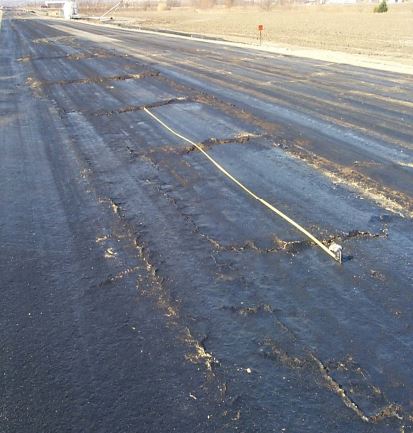What’s the Problem?
When contractors finish a new section of road, it is smooth and meets Texas Department of Transportation (TxDOT) specifications. Then, sometimes within months, sometimes much later, that smooth surface begins to heave and buckle. Driving on that once-smooth road feels more like a roller coaster ride. This was a puzzle that baffled road builders.
After a great deal of study, TTI researchers determined that the roads were being undermined by sulfates. Sulfates are crystal-like soil components that are often found in Texas soils. High concentrations are found in the Eagle Ford Shale formation, which runs in a swath from South Texas across the middle of the state to its northeast corner. Sulfates are not a problem for road builders until they are mixed with calcium-based stabilization agents and then get wet. When this happens, the sulfates expand greatly. If there are enough of them in the soil beneath a roadway, they can cause the surface to heave and buckle.
What’s the Solution?
TTI researchers Stephen Sebesta and Tom Scullion have been working on a solution for years. “We have become missionaries helping road builders understand why sulfate heave occurs and where it might occur. Before any ground is moved, we want to know in advance if there is a potential for a problem. Mitigation strategies can be planned at the beginning instead of after the damage has occurred,” Sebesta said. He pointed towards Internet databases of Texas soils that have been created over many years. Sebesta said that a quick check of web soil maps is a great starting point.
On a site, Sebesta trains people on what to look for in the soil. Sulfate crystals tend to be shiny and visible, particularly on a sunny day. When sulfates are too powdery, this technique does not work. Researchers then produced test kits to measure the electrical conductivity of the soil. This method only produced spot results and did not measure an entire site. To measure an entire site, an instrumented disc harrow with global positioning capabilities is pulled over the location of the roadway. It measures the conductivity of the soil for the entire site. Areas of high conductivity may be due to sulfates.
To mitigate the problem, researchers have discovered that alternative construction techniques can be used after treating the affected area with various chemical stabilizers and water. Instead of immediately compacting the area, it is left to “mellow” until the sulfate reaction is complete. It can then be compacted. “Laboratory testing and field observations tell us that this is a solution to road damage associated with sulfate heave,” Sebesta said.
Benefits
According to Sebesta, mitigating sulfates in soils before construction and preventing heave is a 10-to-1 savings. “When you have sulfate heave problems, the costs to repair a roadway after construction add up quickly. Repairing a pavement with sulfate heave can cost as much as three times the original construction cost, ” he said. Rough roads also result in increased wear on vehicles and may also affect the life of the pavement itself. These costs have not been calculated. Preventing sulfate heave means fewer maintenance dollars being spent by TxDOT and by Texas motorists.
Project Title
Implementation Of Technology For Rapid Field Detection Of Sulfate And Organic Content In SoilsProject Number
Interagency Contract
Project Sponsor(s)
Texas Department of Transportation
Project Category
Infrastructure
Project Publications
For More Information
Thomas Scullion, P.E.
Senior Research EngineerFlexible Pavements
Texas A&M Transportation Institute
Texas A&M University System
3135 TAMU
College Station, TX 77843-3135
Ph. (979) 317-2321 Ext. 42321
[email protected]
Stephen D. Sebesta
Research ScientistFlexible Pavements
Texas A&M Transportation Institute
Texas A&M University System
3135 TAMU
College Station, TX 77843-3135
Ph. (979) 317-2297 Ext. 42297
[email protected]
